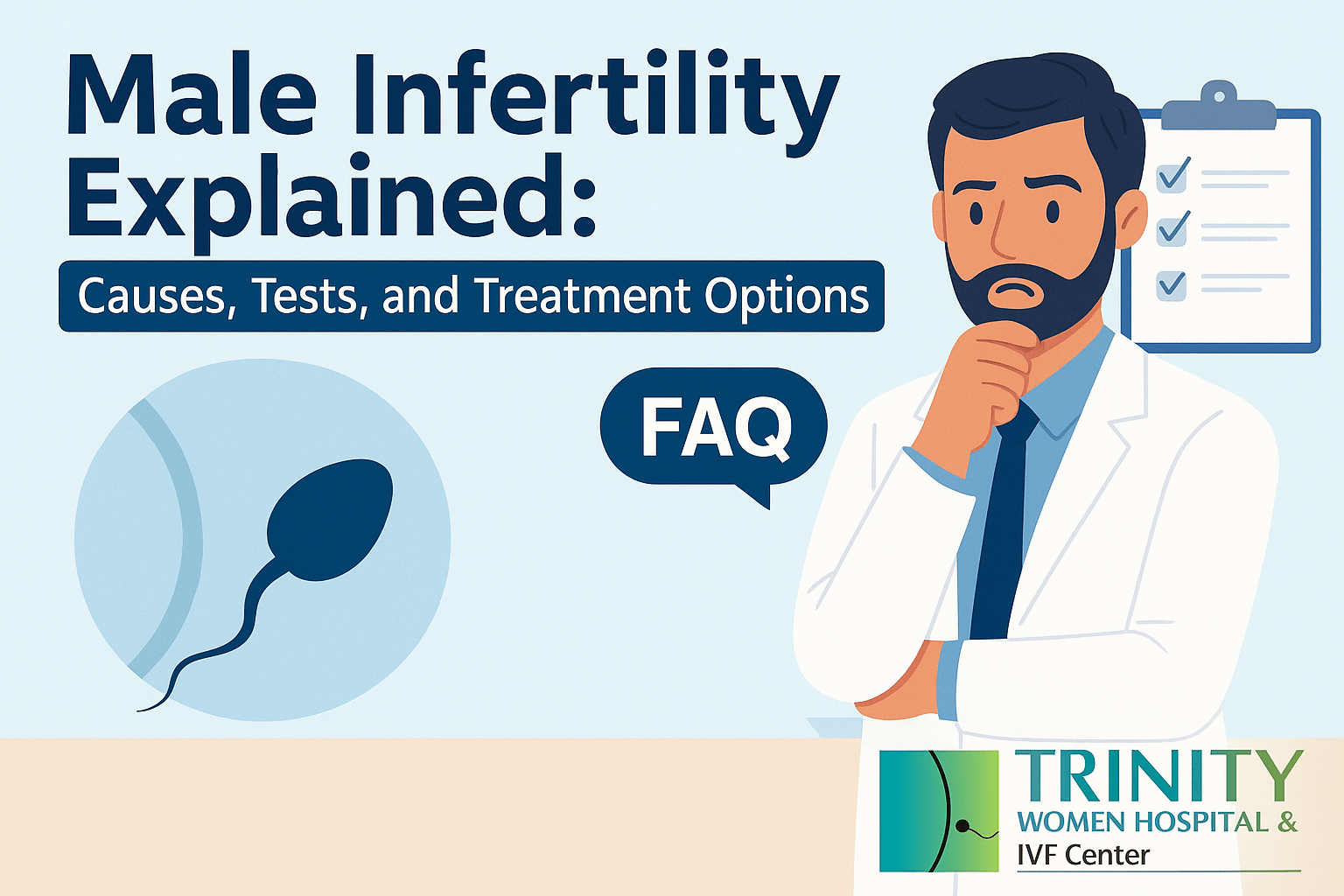Introduction: Understanding the Male Factor
When couples face fertility issues, it’s often assumed that the problem lies with the woman. But in truth, male infertility contributes to nearly 40–50% of all infertility cases. The good news is that male fertility can often be diagnosed and treated effectively.
In this article, we’ll break down the common causes of male infertility, the tests used to diagnose it, and the lifestyle and medical treatments that can help. Plus, hear success stories from patients at Trinity IVF who overcame male factor infertility.
🚫 Common Causes of Male Infertility
There are several reasons why a man’s sperm might not fertilize an egg. The most common include:
1. Low Sperm Count (Oligospermia)
Not enough sperm are produced to fertilize an egg.
2. Poor Sperm Motility
Sperm can’t swim properly to reach and penetrate the egg.
3. Abnormal Sperm Morphology
Sperm shape is irregular, affecting their ability to function.
4. Hormonal Imbalances
Low testosterone or other hormone issues may affect sperm production.
5. Varicocele
Enlarged veins in the scrotum can reduce sperm quality.
6. Infections
STIs or reproductive infections can damage sperm-producing tissues.
7. Lifestyle Factors
Smoking, alcohol, heat exposure, stress, and obesity may lower fertility.
🔬 Diagnostic Tests for Male Fertility
At Trinity IVF, a thorough male fertility evaluation includes:
- Semen Analysis: Measures sperm count, movement, shape, and volume.
- Hormonal Testing: Assesses testosterone, FSH, LH, and prolactin levels.
- Scrotal Ultrasound: Detects varicocele or blockages.
- Genetic Tests: In severe cases, identifies hereditary conditions.
- Testicular Biopsy: Done if no sperm are found in semen.
These tests help tailor the right treatment plan for each individual.
💊 Lifestyle & Medical Treatments
Depending on the underlying cause, male infertility may be treated with:
- Lifestyle Changes
- Stop smoking and drinking alcohol
- Reduce stress and improve sleep
- Maintain a healthy weight
- Wear loose clothing and avoid hot tubs
By adopting these changes, many men see improvement in sperm quality.
- Supplements
Zinc, selenium, folic acid, and CoQ10 may boost sperm health. These nutrients play a vital role in sperm production and function. - Hormonal Therapy
Used when imbalances affect sperm production. It helps restore hormonal balance, improving fertility. - Antibiotics
To treat infections affecting reproductive organs. Early treatment can prevent long-term damage. - Surgical Treatments
For conditions like varicocele or blockages. When other treatments fail, surgery might offer the best solution.
🧪 When to Consider IVF or ICSI

If natural conception isn’t working despite treatment, couples may need assisted reproduction:
- IVF (In Vitro Fertilization): Eggs and sperm are combined in a lab to create embryos.
- ICSI (Intracytoplasmic Sperm Injection): A single healthy sperm is injected directly into an egg—ideal for severe male factor infertility.
At Trinity IVF, we use advanced ICSI technology and highly skilled embryologists to achieve high success rates, even in complex male infertility cases.
🌟 Success Stories from Trinity IVF
One of our patients, a 36-year-old male with zero sperm count (azoospermia), underwent a testicular sperm extraction (TESE) followed by ICSI. Today, he and his wife are proud parents of twin boys. Another couple overcame poor sperm motility through ICSI and welcomed a baby girl after their second cycle.
“We felt hopeless after multiple failed attempts elsewhere. Trinity IVF gave us a clear diagnosis, treatment, and most importantly, hope,” shares a patient.
FAQ ❓
1. What are the main causes of male infertility?
Male infertility can be caused by low sperm count, poor sperm motility, hormonal imbalances, or blockages in the reproductive tract. Lifestyle issues like smoking, stress, and obesity also play a role. Sometimes, genetics or infections can affect fertility as well.
2. How is male infertility diagnosed?
Diagnosis starts with a semen analysis to check sperm count, shape, and movement. Doctors may also recommend hormone tests, scrotal ultrasounds, or genetic screenings. At Trinity IVF, we offer advanced male fertility testing in a comfortable setting.
3. Is male infertility treatable?
Yes! Depending on the cause, treatments can include medications, hormone therapy, lifestyle changes, or minor surgeries like varicocele repair. In more complex cases, assisted reproductive techniques like IVF or ICSI may be advised.
4. Can stress cause male infertility?
Yes, chronic stress can impact hormone levels and sperm production. It may also affect sexual function. Reducing stress through yoga, therapy, or lifestyle changes can sometimes improve fertility naturally.
5. What lifestyle changes improve male fertility?
Quitting smoking, avoiding alcohol, maintaining a healthy weight, eating antioxidant-rich foods, and staying active are key steps. Reducing exposure to heat and toxins (like laptops on lap or tight underwear) also helps.
🎯 Conclusion: Male Fertility Can Be Treated
Male infertility is more common than most realize—and in many cases, it’s treatable with the right care. The key is not to delay evaluation and treatment. With the right diagnosis, lifestyle changes, and fertility support, fatherhood is still possible.
If you suspect male factor infertility, reach out to Trinity IVF for a full consultation and start your journey to parenthood with confidence.

